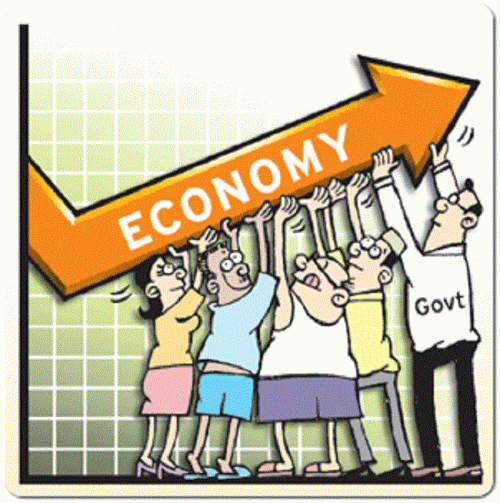
Here’s what the economists from Canada’s major banks — TD, CIBC, Royal Bank, Scotiabank and Bank of Montreal — are saying about the economic lookout during the 2014’s panel discussion hosted by the Toronto Region Board of Trade
“Compared to other developed economies, the U.S is actually a relatively low-cost place to make goods, partly because it doesn’t require as much labour as it used to thanks to cheap power and mechanization” — CIBC chief economist Avery Shenfeld.
1. The U.S. manufacturing sector has “got its mojo back!”
2. Millennials living in their parents’ basements are holding the homebuilding sector back. Why? A huge student debt and poor job prospects (which is the next point). Thus they cannot afford to start the new families at the age of 25 or 30 the way their parents did.

Student Loans in Canada | Photo Credit: Salon

Student Loans in Canada | Photo Credit: Employment and Social Development Canada (ESDC)
3. The Canadian job market has been disappointing. One of the most pronounced changes has been “the shift to part-time and temporary employment”.
“Companies are feeling a lot of heat these days and looking for more flexible arrangements” — TD economist Derek Burleton

Job Search Maze | Photo Credit: Heriot-Watt
4. Expect a “healthy pause” in the housing market.
“High consumer debt levels are still cause for concern, and will limit spending. In the housing market, debt burdens combined with poor affordability likely mean flat growth ahead” — Paul Ferley, assistant chief economist at RBC
5. Three per cent growth is the new four per cent growth. US’s total GDP growth is expected to be 3 per cent while Canada’s total GDP growth is expected to be closer to 2.5 per cent.
6. Canada’s export-led recovery is real! External trade has also benefited from a weakening Canadian dollar.
“The Canadian dollar will fall even further through to 85 cents U.S. next year.” — Paul Ferley, assistant chief economist at RBC
7. The economies of the BRIC (Brazil, Russia, India and China) countries have landed like a brick. Brazil and Russia are in recession: China is slowing down: India is movin a little bit. Pre-recession global growth was around five percent and today`s global growth is hovering close to three percent.

BRIC – Brick | Photo Credit: cfi.co
After learning these seven economic lookouts, the big questions for everyone including the millennials – perhaps the recent graduates with massive student loans and credit card debts – are:
- What does it mean to me?
- What should I be doing?
- How? Or what steps do I need to take so I can take care of myself…and my family? So I can live a life and be worry-free.

Photo Credit: dLife

Photo Credit: Tricommstrategies
Stay tuned. In a few days, I’ll be covering the answers to the questions asked above.
Thanks for reading this post. And please feel free to comment, like and share this post. I wish you’ll have a lovely day!
Citation: Freeman, Sunny, Mr. “8 Things You Need To Know From Canada’s Big Bank Economists.” The Huffington Post. N.p., 23 Sept. 2014. Web. 23 Sept. 2014.